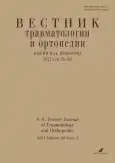Evaluation of the effectiveness of the use of low-traumatic surgical access in the reverse shoulder arthroplasty
- Authors: Kesyan G.A.1, Karapetyan G.S.1, Shuyskiy A.A.1, Urazgil'deev R.Z.1, Arsen'ev I.G.1, Kesyan O.G.1, Shevnina M.M.1
-
Affiliations:
- N.N. Priorov National Medical Research Center of Traumatology and Orthopedics
- Issue: Vol 28, No 2 (2021)
- Pages: 21-28
- Section: Original study articles
- URL: https://bakhtiniada.ru/0869-8678/article/view/64822
- DOI: https://doi.org/10.17816/vto64822
- ID: 64822
Cite item
Abstract
BACKGROUND: The number of reversible shoulder joint endoprostheses installed in the world at the present stage is several times greater than the number of hemiarthroplasty performed. Nevertheless shoulder arthroplasty is considered a traumatic operation and can be accompanied by a number of complications, both from the side of implants and due to the traumatic nature of the surgical technique. During surgical interventions on the shoulder joint with a wide dissection of the skin and subcutaneous tissue, iatrogenic damage to structures such as the axillary nerve, posterior and anterior arteries and veins surrounding the humerus can often be detected, which triggers a whole cascade of pathophysiological and regulatory processes in which Interventions immediately release inflammatory mediators. Therefore, orthopedic traumatologists strive to reduce the risk of intra- and postoperative complications, and it is necessary to improve the surgical technique of surgical interventions towards their less traumatic performance.
AIM: Development and evaluation of the effectiveness of the use of low-traumatic surgical access when performing reverse shoulder arthroplasty.
MATERIALS AND METHODS: In the period 2017–2020, 169 patients with various diseases, injuries of the shoulder joint and their consequences were operated on in the Department of Adult Orthopedics of the N.N. Priorov National Research Medical Center of the Russian Federation, who underwent reverse shoulder arthroplasty according to generally accepted indications. In the main group (84 patients), surgical treatment was performed using a low-traumatic surgical approach, while the control group (85 patients) underwent standard procedures. Functional, clinical and radiological results of surgical treatment of patients of the main and control groups were evaluated and compared after 3, 6 and 12 months.
RESULTS: In the main group, excellent results (<25 points on DASH) were observed in 73 patients, good results (26–50 points) — in 10 patients. In 1 patient, the results were assessed as satisfactory (51–75 points). In the control group of observation, the clinical result was worse (68 excellent, 16 good and 1 satisfactory result).
CONCLUSION: On the basis of the performed study, taking into account the better results in the main group of patients, the technique of low-traumatic surgical access for reverse shoulder arthroplasty can be recommended for wide use in clinical practice.
Full Text
##article.viewOnOriginalSite##About the authors
Gurgen A. Kesyan
N.N. Priorov National Medical Research Center of Traumatology and Orthopedics
Email: kesyan.gurgen@yandex.ru
ORCID iD: 0000-0003-1933-1822
SPIN-code: 8960-7440
MD, PhD, Dr. Sci. (Med.)
Russian Federation, 10, Priorova St., 127299, MoscowGrigoriy S. Karapetyan
N.N. Priorov National Medical Research Center of Traumatology and Orthopedics
Email: dr.karapetian@mail.ru
ORCID iD: 0000-0002-3172-0161
SPIN-code: 6025-2377
MD, PhD, Cand. Sci. (Med.), traumatologist-orthopedist
Russian Federation, 10, Priorova St., 127299, MoscowArtem A. Shuyskiy
N.N. Priorov National Medical Research Center of Traumatology and Orthopedics
Email: shuj-artyom@mail.ru
ORCID iD: 0000-0002-9028-3969
SPIN-code: 6125-1792
MD, post-graduate student, traumatologist-orthopedist
Russian Federation, 10, Priorova St., 127299, MoscowRashid Z. Urazgil'deev
N.N. Priorov National Medical Research Center of Traumatology and Orthopedics
Email: rashid-uraz@rambler.ru
ORCID iD: 0000-0002-2357-124X
SPIN-code: 9269-5003
MD, PhD, Dr. Sci. (Med.), traumatologist-orthopedist
Russian Federation, 10, Priorova St., 127299, MoscowIgor' G. Arsen'ev
N.N. Priorov National Medical Research Center of Traumatology and Orthopedics
Email: igo23602098@yandex.ru
ORCID iD: 0000-0003-1801-8383
SPIN-code: 8317-3709
MD, PhD, Cand. Sci. (Med.), traumatologist-orthopedist
Russian Federation, 10, Priorova St., 127299, MoscowOvsep G. Kesyan
N.N. Priorov National Medical Research Center of Traumatology and Orthopedics
Email: offsep@yandex.ru
ORCID iD: 0000-0002-4697-368X
SPIN-code: 4258-3165
MD, PhD, Cand. Sci. (Med.), traumatologist-orthopedist
Russian Federation, 10, Priorova St., 127299, MoscowMargarita M. Shevnina
N.N. Priorov National Medical Research Center of Traumatology and Orthopedics
Author for correspondence.
Email: margarita.shevnina@mail.ru
ORCID iD: 0000-0003-2349-590X
MD, post-graduate student, traumatologist-orthopedist
Russian Federation, 10, Priorova St., 127299, MoscowReferences
- Frankle M, Marberry S, Pupello D. Reverse shoulder arthroplasty. Cham; 2016. 486 p.
- Karapetyan GS. Metody korrektsii operativnoi agressii v kompleksnom lechenii ortopedicheskoi patologii [dissertation abstract]. Moscow; 2009. 90 p. (In Russ).
- Magosch P, Burkhart K, Mauch F, et al. Schulterprothesenregister Jahresbericht 2020 (2006-2019). Bern; 2020. 61 p. (In German).
- Reed M, Howard P, Brittain R, et al. National Joint Registry 17th Annual Report. Hemel Hempstead; 2020. 312 p.
- Kesyan GA, Urazgil’deev RZ, Karapetyan GS, et al. Reverse shoulder arthroplasty in difficult clinical cases. Vestnik Smolenskoi gosudarstvennoi meditsinskoi akademii. 2019;(4):111–120. (In Russ).
- Bauer R, Kershbaumer F, Poisel S. Operativnye dostupy v travmatologii i ortopedii. [Operative Zuganswege in Orthopadie und Traumatologie]. Translated from German. Yakimov LA, editor. Moscow: Izdatel’stvo Panfilova; 2015. 408 p. (In Russ).
- Solod EI, Lazarev AF, Gudushauri YaG, et al. New possibilities of surgical treatment of fractures of the proximal humerus. Vestnik travmatologii i ortopedii im. N. N. Priorova. 2011;(1):21–27. (In Russ).
Supplementary files










